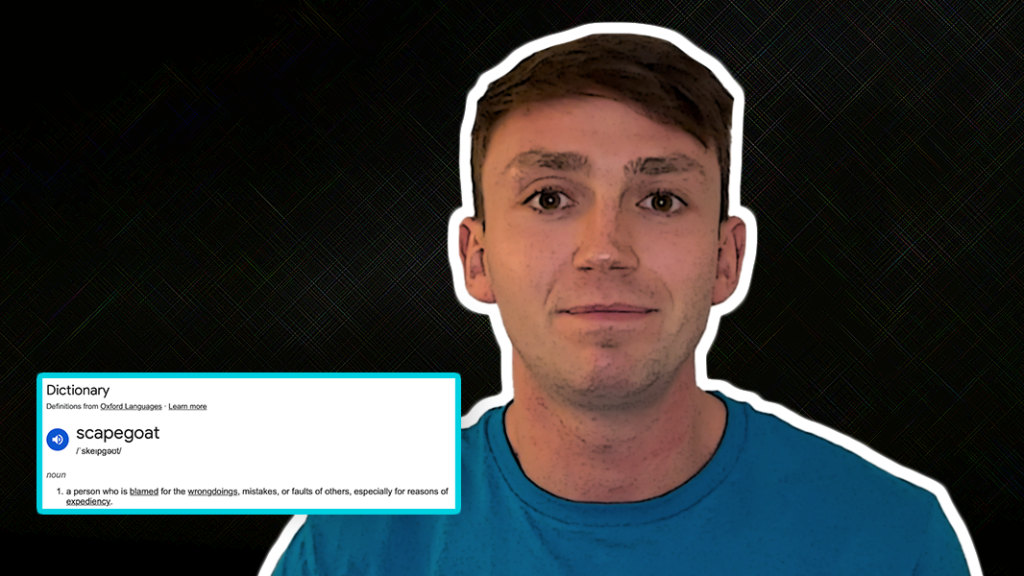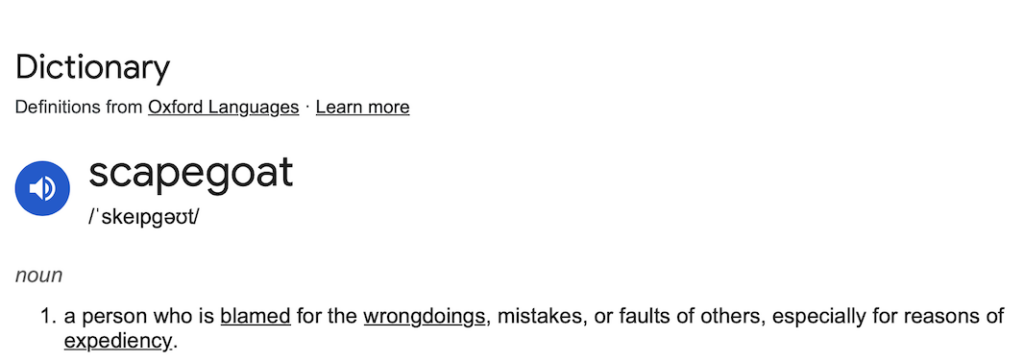

My ‘how to guide’: Becoming the perfect scapegoat

There are estimates that about 90% of decisions that addicts make are based around the continuation of their addiction. With that in mind, for me to become a scapegoat was an inevitability.
With my personal experience with alcoholism in the home, it was always critical that there was something else that was considered the primary problem…. Of course, because this justifies the continuation of their drinking. Unfortunately, that ‘something else’ became me.
Here is my step-by-step guide to becoming an excellent scapegoat (so you can avoid it!):
Step 1: Act in a way that might discredit your future statements
When I was young, I would often lash out in aggressive or unnecessary acts. Interestingly, no one had ever correlated my reactions to what was clearly the primary problem – parental drinking at home. For me to become an excellent scapegoat, this was my first step.
I am sure we have all been angry at slipping on a banana in Mario cart…. Perhaps we’ve not all smashed a computer because of it though. Joking aside, I behaved this way for a period of about a decade which came back to haunt me.
My extended family had been made aware that I act irrationally to small issues, but the parental alcoholism had been kept secret within the immediate family. When I chose to speak out to my extended family, there is a decade of evidence of me acting out of character that may suggest I am the one to blame. By contrast, this was the first time they heard of the issue of alcoholism and you’ll find people do not like their world view to change like this.
If you are a viable threat to exposing the alcoholism in your family, be aware that allowing discrediting statements to be said about you over long periods of time can create a counter narrative.
While I accept behaving in that way was unacceptable (and of course do not act like that anymore), it is one of many tertiary issues in my family environment. The primary issue being the alcoholic and their behaviour…. and secondary the enablement and secrecy that allowed it to continue.
Step 2: Get drunk and do things you regret
Cognitive behavioural theories view alcoholism as a learned behaviour. There is no shortage of studies detailing the high prevalence of alcoholism in relatives, with increased risk in the children of alcoholics (about 4 x as likely).
The psychological concept of projection is when someone recognises objectional traits in others as a defence mechanism to avoid recognising it in themselves. For me to solidify my identity as the perfect scapegoat, falling into the trap of being drunk and disorderly helped build that case.
It is not uncommon in Scotland (particularly the west of Scotland) to drink underage. From my early teens I was drinking and misbehaving. While it was not uncommon, the extent that I would drink to, was.
Part of my behaviour I could assign to being learned, however partly this could be down to my personality.
I began to act out in a way and disregard consequences. If the talk of the town is that you were acting up in the pub, or waking up in the police cell, it makes having any credibility very difficult.
The NIAAA (National Institute on Alcohol Abuse and Alcoholism) states that both alcoholism and childhood aggression are common in children of alcoholics.
Like my statements in step one, I am not claiming to be an angel and circumventing responsibility for behaving like this. That being said, the key distinctions are; if you are a child or young person, behaving or displaying a textbook response to your circumstances… you are not the primary issue.
Often though, in scapegoating situations your antisocial behaviour becomes a projection tool for the toxic member of your family. This allows them to blame you, and not alcohol, which is one factor that affected my life in my teens.
Step 3: Trust them when they say it is your fault
Did you lose your keys, fail a test or make a small mistake like this? Did this result in vast overreactions because your parent is intoxicated?
The final step to becoming a scapegoat is taking responsibility and blame in these situations…. Tell yourself the unrelated shouting is a result of your small mistake.
I won’t dwell on real-life examples with this one. Janet G. Woititz, a New York Times best-selling author on the subject, states that children of alcoholics often need to guess what normal behaviour is. Growing up in any sort of chaotic environment, it is easy to blame yourself when you are not sure what a ‘normal’ reaction from a trusted adult is.
In my experience, a lot of the scapegoating I received was in this form. My family members would take an example of my behaviour, something of far lower severity, and use it to justify the primary issue of parental drinking.
I became used to hearing phrases like “They are as bad as each other…. Because *insert excuse*”. These are often used as coping mechanisms when people are not ready to confront the truth.
Conclusion: My advice to scapegoats
- Set goals that make your character irrefutable once you have accomplished them.
- Find positive role models that have aspects in their life that you admire and would want in yours.
- Read about common traits of children of alcoholics and try avoiding falling into the same traps that I have
Scott
To read more experience stories, go to Support & Advice.

























































































